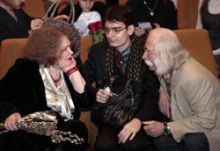On March 28, the Ukrainian Home hosted the launch of Lina Kostenko’s collection of verse Hiatsyntove sontse (The Hyacinth Sun), which Olha Bohomolets uses as lyrics for her songs. The room was packed, with additional seats provided and people standing in the aisles and near the screen. Some of the organizers were afraid that the younger generation knew little about Kostenko’s poetry, given that her books hadn’t appeared in print for several decades. They were wrong. There were many young people, even children in the audience. Incidentally, there is a popular website with a Kostenko book lovers’ club where young visitors exchange her poems — like their parents did, borrowing and lending Kostenko’s Selected Poems or Garden of Unthawed Sculptures, in order to make a handwritten copy during the night. I remember my mom receiving a birthday postcard with a quote from Kostenko’s Song with Variations: “You have to live through all things in this world…” Thus her pieces turned into folk poems and aphorisms, perhaps because Kostenko’s work is “a metaphor of Ukraine, still struggling to find the underpinning principles of its existence,” as the soiree’s emcee Yurii Makarov aptly put it.
“However, despair is one of the deadly sins,” he went on to say, “and so, in a situation like this, any normal individual seeks support in eternal values.”
Writer and cultural expert Oxana Pachlovska told us: “The Hyacinth Sun was being printed by Lybid when Berestechko was being prepared for publication. Svitlana Holovko, the editor in chief, once said she had a dream in which Olha Bohomolets was singing songs to the lyrics from Kostenko’s collection of verse. I’m scared to hear about such dreams, as they are too good to be true. Yet this dream came true. It is the result of dialog between verse and music. In the end we realized that such poetry and music required unique illustrations made by an artist of cosmic talent. His name was Ivan Marchuk… Olha Bohomolets actually worked on an interpretation of verse and paintings created by two noted personalities of the 1960s. I can’t say that the Sixtiers’ movement is coming back; it is a cultural substance that never fades. It has endured countless betrayals and ordeals, and survived anti-cultural persecution. Currently this phenomenon is a response to all past and present experiences. With her voice Olha combined all these artistic themes into not just a Ukrainian but also a European work of art. I am thankful to all who will read The Hyacinth Sun. Aesthetics is also form of protest against vulgarity, violence, and crass.”
When the poet appeared on stage and approached the microphone, all in the audience stood up and started chanting Lina! Lina! Such an atmosphere of national revival was tangibly present had not been felt since the Maidan. “I am grateful to the Lybid Publishers for their present,” said Lina Kostenko, “for making me aware of the publisher-writer-people triangle. For what is a jubilee all about, with all that formal pomp? Nothing compared to the awareness of this precious trio, especially when you know that Olha Bohomolets and Ivan Marchuk are somewhere in the audience. Knowing this makes me so happy! I’m also thankful to all who came to the soiree. As for defeat, there is this Japanese saying: He who can wait fifteen minutes longer wins. I wish you all to endure that long. We will win in the sixteenth minute anyway!”
During the soiree her best-known poems, including “An Autumnal Day,” “My Man, Harness the Horse!”, “In this Hostile and Cold World,” “Poetry Destroyed the Tuning Fork,” “I am in this World not for Bullfights,” “We’ve had Hard, Trying Times,” “An Old Woman Walking down that Road,” “Autumnal Day Began with Birch Trees,” were masterfully performed by the Kyiv Kamerata National Ensemble of Soloists (conducted by Valerii Matiukhin), and the jazz sextet United People from the Shostakovich Music School in Kyiv. Incidentally, Olha Bohomolets’ song versions of Kostenko’s poems were performed as contemporary jazz/rock arrangements by Oleksii Proshchenkov and Andrii Bohomolets for the first time.
Says Oleksii Proshchenkov: “We felt gratified working on these arrangements because Lina Kostenko’s poetry and Olha Bohomolets’ music are a fertile soil. I’m especially fond of the poet’s historical works (included in a CD — Ed.). You re-read them and realize that it’s not a museum but contemporary topical history. Kostenko’s lyrical poems are classical, and classical works are always exciting. Her poetry is about things eternal, and most importantly, it is life-asserting.”







